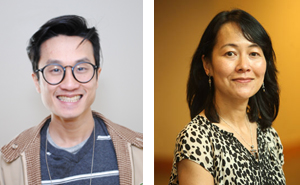Pham and Cravens explore “What Students Value Most” in online degree programs
By Cynthia J. Brame

Associate professor of the practice in LPO Xiu Cravens and Vanderbilt doctoral alumnus Lam Pham recently published an analysis of student experiences in an online Ed.D. program, identifying key program characteristics and structures for promoting student engagement and satisfaction in a fully online program. Pham, who is currently an assistant professor in Educational Leadership, Policy, and Human Development at NC State University, initiated this project as part of the CFT’s BOLD program* in 2018-2019 while he was working toward his Ph.D. in K-12 Educational Leadership and Policy Studies. During that project, the pair made some initial observations that inspired them to continue and extend the collaboration, bringing on board NC State doctoral student Gage Matthews.
The collaboration resulted in their recent paper, “What Students Value Most: A Qualitative Examination of Learner Experiences in a Fully Online Degree Program” in Teachers College Record. They report the results of interviews with 31 students in an online Ed.D. program, analyzing interview transcripts using a grounded theory approach and the How People Learn Framework. They found that students identified five community-centered program structures as providing particular value to their online educational experience: facilitating peer-to-peer interactions, establishing norms and expectations, differentiating for learning preferences, explaining the strengths and limitations of technology, and supporting student-driven initiatives. They also identify four learner-centered program characteristics that students valued: diversity, authenticity, safety, and individuality. Their findings have important implications for design and implementation of online programs, providing input both for overall program structure and day-to-day teaching within such programs.
Pham noted the benefits he has found from linking his research and teaching: “The Blended & Online Learning Design (BOLD) Fellows program sponsored by Vanderbilt’s CFT was the seed that began this entire research project for me. I remember wanting to get experience teaching online while I was in my PhD program at Vanderbilt, so when an opportunity to be teaching assistant for Dr. Xiu Cravens came up in a new online EdD program in Peabody College, I jumped right in. At around the same time, Dr. Cravens saw some communications around the BOLD program and suggested I think about doing a research project to help solidify what I was learning through my work in the online program. That turned out to be sage advice because trying to frame what I was learning about online pedagogy in a research project really helped me to organize and solidify my thinking. This was also where the structure of the BOLD program was especially helpful. Since online learning wasn’t a part of my research agenda at the time, the opportunity to meet regularly with other BOLD fellows and experts at the CFT to design, develop, and improve my project really gave me time and space to develop my thinking. As with all research, the work continued to develop for Dr. Cravens and me even after my year long experience with the BOLD program ended. Eventually, we came to realize that we were studying how students build relationships with each other while learning online, not in one-off classes here and there, but in a fully virtual experience where students take every class in their degree program online. Little did we know that this experience would become so intensely personal for so many students during this COVID-19 pandemic. Our findings suggest that students can form remarkably deep and personal connections through the virtual format, some getting to a point of texting each other daily and even planning trips to meet in person. However, in juxtaposition to that finding, we also found that students repeatedly emphasized the importance of building connections through a short weekend-long, in-person “immersion” experience on campus. For me, this appears to be an under-explored cognitive tension where students simultaneously reported feeling like they could form deep personal relationships without ever having to meet in person while also saying that even short in-person experiences took their relationship with each other to a deeper level that could not be achieved without the physical, embodied experience. Overall, this experience fusing my pedagogy with my research, which would not have happened without the BOLD program, has opened doors into a new, timely, and fascinating strand of scholarship that I hope to continue exploring. It also has vastly improved my online pedagogy, which has come in handy many times over since I have had to teach many of my classes fully online over the last couple of years!”
Cravens added, “It was a joy and privilege to work with Lam. Both of us are interested in studying the impact of instruction on student learning as researchers. But more importantly, we want to use such research to inform the practice of teaching. The BOLD Fellowship provided an excellent opportunity for Lam and me to partner and to share our work with a larger learning community. I hope that there will be more opportunities like this one.”
*In 2020, the CFT’s BOLD program morphed from a program designed to support scholarship of teaching and learning (SOTL) projects for graduate student-faculty teams to a new structure. For current CFT programs that support SOTL, see the CFT’s teaching grants program and ongoing learning communities.

Leave a Response